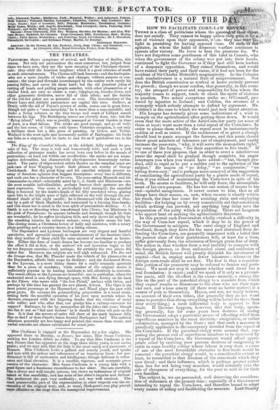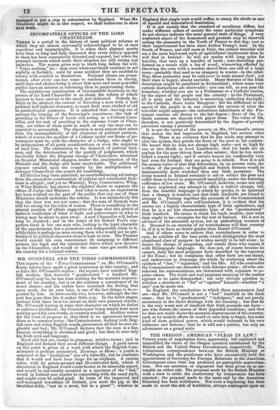TOPICS OF THE D HOW TO FACILITATE CORN-LAW • r
•-)■•••i THERE is a class of politicians whom the plain:. does not satisfy. They cannot be happy unless thli sort of violence upon their opponents, whom they .
light in punishing for having opposed them. Of
agitator, in whom the habit of desperate warfare continues to operate after victory. He loves to beat the prostrate foe. We have not forgotten some gentlemen of this kind in Canada, who when the government of the colony was put into their hands, continued to fight the Governor as if they had still been leaders of a desperate opposition. They ruined themselves, and would have ruined their party and their cause, if it had not been for the accident of Sir Charles Metealfe's magnanimity. In the Colonies such combativeness is a natural fruit of misgovernment. Nor does the British constitution as worked at home entirelyprevent its growth ; though we must confess, that generally,. in this coun- try, the prospect of power and responsibility for him whom the majority comes to support, tends to check the spirit of violence in question. Two actual exceptions strike us : O'Connell, pro- duced by injustice to Ireland ; and Cobden, the creature of a monopoly which nobody attempts to defend by argument. Mr.
i Cobden's is the case to which we would just now direct attention.
His League has recently given some indications of a wish to trample on the agriculturists after getting them down. It would seem that the more active of the Anti-Corn-law party (or some of them at least) want more than a total repeal of the Corn-laws. In order to please them wholly, the repeal must be instantaneously sudden as well as entire. If the suddenness of so great a change -should lead to panic amongst the farmers, and this panic should throw great numbers of labourers out of employment, and vastly increase the poor-rate, "why, it will serve the monopolists right," say some of the League, " for their opposition to free trade." If to one of these you propose, that in order to avert a mischievous panic the repeal shall be gradual though complete, his anger interrupts you when you would have added—" but, though gra- dual, still so rapid as to put a sudden end to the agitation of the subject." He insists on " no delay," " no compromise," no letting down easy," and is perhaps more annoyed at the suggestion of conciliating the agricultural party by a gentle mode of repeal, than if you talked of maintaining the Corn-laws in spite of his teeth. He scorns to facilitate, he will only force, the accomplish- ment of his own purpose. He has but one notion of means to his end—spiteful antagonism. It never occurs to him, that as all things have their season, so, now, when success is clearly within his reach, the time has come for avoiding risks and employing facilities—for helping on by every conceivable aid that conclusion which nothing can prevent, nor anything long delay save the desperation of the party which is yielding. There are Leaguers who appear bent on making the agriculturists desperate. In this pursuit such Free-traders wholly overlook a difficulty in the way of Corn-law repeal, which it may be in the power of the Government to mitigate. The rural clergy of England and Scotland, though they have for the most part abstained from de- fending the Corn-laws, are generally impressed with a belief that the poorest class of their parishioners will, at least for a time, suffer grievously from the admission of foreign grain free of duty. The notion is, that whether from a real inability to compete with the foreign grower, or from unfounded alarm and confusion of mind, the British farmer will greatly diminish his investment of capital—that is, employ much fewer labourers—whenever the foreign corn-trade shall be set free. The fear is that a consider- able portion of the peasantry may be reduced to famine and pesti- lence. We need not stop to examine whether such dread has a real foundation : it exists ; and if we speak of it only as a ground- less panic, still the ill-effect is the same—namely, a strong dis- like on the part of the parochial clergy to a measure from which they expect results so disastrous to the class who are their espe- cial care, and whose misery (if there were no better motive) is a source of pain to themselves. Hence, and not, we really believe, on account of their own tithes, (for generally they do not want sense to perceive that cheap everything will be better for them than dear everything,) a most influential body is opposed to free trade. It likewise happens, however, that this body, speak- ing generally, has for some years been desirous of seeing the Government adopt a_particular means of affording relief from superfluous numbers in the rural districts —emigration, or rather colonization, managed by the State ; and that such a measure is peculiarly applicable to the emergency dreaded from the repeal of the Corn-laws. If the parochial clergy were assured that, sup- posing the present evil of superfluous numbers to be increased by a repeal of the Corn-laws, the Government would afford appro- priate relief by enabling poor persons desirous of emigrating to settle in some healthy colony where labour is very dear, a cause of one of the most formidable obstacles to free trade would be removed : the parochial clergy would, to a considerable extent at least, be reconciled to that freedom of the corn-trade which they now dread ; and their influence, which is perhaps greater rather than less for not being very manifest, would naturally take the side of cheapness of everything, for the poor as well as for their own families.
The subject is, we are persuaded, well deserving the considera- tion of statesmen at the present time ; especially of a Government intending to repeal the Corn-laws, and therefore bound to adopt every means of aiding and facilitating the measure. Lord Stanley managed to put a stop to colonization by England. What Mr. Gladstone might do in this respect, we shall endeavour to show next week.































 Previous page
Previous page